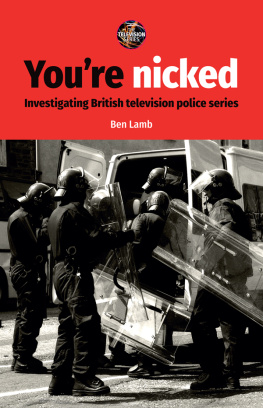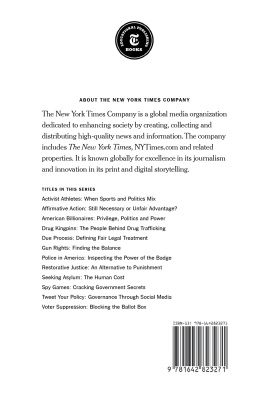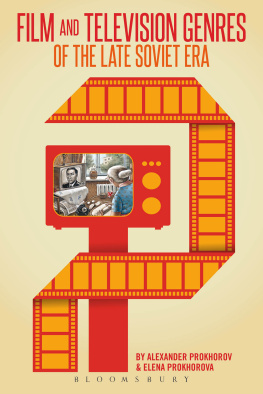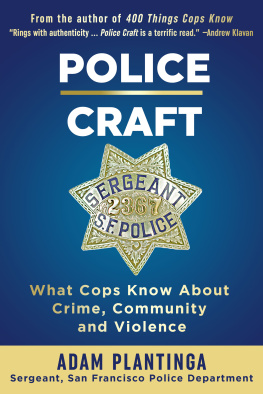TV COPS
The police drama has been one of the longest running and most popular genres in American television. In TV Cops , Jonathan Nichols-Pethick argues that, perhaps more than any other genre, the police series in all its manifestationsfrom Hill Street Blues to Miami Vice to The Wire embodies the full range of the cultural dynamics of television.
Exploring the textual, industrial, and social contexts of police shows on American television, this book demonstrates how police dramas play a vital role in the way we understand and engage issues of social order that most of us otherwise experience only in such abstractions as laws and crime statistics. And given the current diffusion and popularity of the form, we might ask a number of questions that deserve serious critical attention: Under what circumstances have stories about the police proliferated in popular culture? What function do these stories serve for both the television industry and its audiences? Why have these stories become so commercially viable for the television industry in particular? How do stories about the police help us understand current social and political debates about crime, about the communities we live in, and about our identities as citizens?
Jonathan NicholsPethick is Associate Prefessor of Media Studies at DePauw University. His work has appeared in The Velvet Light Trap, Cinema Journal , and in the anthology Beyond Prime Time: Television Programming in the Post-Network Era .
First published 2012
by Routledge
711 Third Avenue, New York, NY 10017
Simultaneously published in the UK
by Routledge
2 Park Square, Milton Park, Abingdon, Oxon OX14 4RN
Routledge is an imprint of the Taylor & Francis Group, an informa business
2012 Taylor & Francis
The right of Jonathan Nichols-Pethick to be identified as author of this work has been asserted by him/her in accordance with sections 77 and 78 of the Copyright, Designs and Patents Act 1988.
All rights reserved. No part of this book may be reprinted or reproduced or utilized in any form or by any electronic, mechanical, or other means, now known or hereafter invented, including photocopying and recording, or in any information storage or retrieval system, without permission in writing from the publishers.
Trademark notice : Product or corporate names may be trademarks or registered trademarks, and are used only for identification and explanation without intent to infringe.
Library of Congress Cataloging in Publication Data
Nichols-Pethick, Jonathan.
TV cops: the contemporary American television police drama / Jonathan
Nichols-Pethick.
p. cm.
Includes bibliographical references and index.
1. Detective and mystery television programsUnited StatesHistory and
criticism. 2. Television cop showsUnited StatesHistory and criticism.
I. Title.
PN1992.8.D48N53 2012
791.45'6556dc23
2011045116
ISBN: 978-0-415-87787-9 (hbk)
ISBN: 978-0-415-87788-6 (pbk)
ISBN: 978-0-203-85502-7 (ebk)
Typeset in Bembo
by Cenveo Publisher Services
ACKNOWLEDGMENTS
The process of writing this book has put me in mind of a scene from Nick Hornbys novel High Fidelity in which Rob Flemings girlfriend praises him for producing something real instead of continuing in his role as a professional appreciator. But like anyone who puts something out there, I havent done this alone. The following people deserve my deepest thanks and, well, appreciation.
Matthew Byrnie first encouraged this project during his tenure at Routledge. Erica Wetter along with Margo Irvin took it on when Matt left. Sioned Jones guided the manuscript through the final production stages. Dan Hardings attention to detail and style made every page of this book better. Each of you has shown me a tremendous amount of patience and kindness over the years that it took me to get the manuscript completed and into your hands. I couldnt have worked with a smarter, more professional, insightful, and encouraging group of people.
Perhaps more than any other person, Chris Anderson has helped guide this project with patience, wisdom, and stamina. From his first enthusiastic encouragement of my impulse to write about cop shows (fifteen years ago), to the moment I completed the final draft of this book, Chris has been the central figure in my academic career, and a great friend. Michael Curtin has also been with this project from the beginning. His wealth of ideas continues to push my thinking about television and film in wonderful new directions. There are parts of this book that would literally have been impossible without him, not the least of which was the very last push. Over breakfast one day in Santa Barbara, Michael posed a what if question to me. The possibility he laid out clarified my project in ways I couldnt myself. From that moment on, I knew I could finish the book. Joan Hawkins has been one of the best friends and mentors I could hope for: enormously generous with her time, energy, encouragement, and insights. And one of the smartest and nicest people Ive ever met. Period. Jim Naremore was also instrumental in helping me get the project off the ground and through its early stages. Jims own work is a model for any and all academics to follow, and his ability to generate profoundly useful advice from the slightest slivers of my ideas has made me a much stronger writer and thinker.
Many friends and colleagues have lived through this with me, and offered me guidance and support along the way, whether they know it or not: Amanda Lotz, Tim Havens, Jon Kraszewski, Sue Kraszewski, Bjorn Ingvoldstadt, Lori Hitchcock, Sherra Schick, Darrell Enck-Wanzer, Suzanne Enck-Wanzer, Chris Dumas, Bob Rehak, Jim Kendrick, Tonia Edwards, Jeff Bennet, Claire Sisco-King, David Moscowitz, Kristy Horn-Sheeler, Jason Mittell, Jonathan Gray, Serra Tinic, Sharon Ross, Todd Avery, and Gigi Thibodeau. Each of you has helped me get to the finish line in one way or another, and I thank you.
My colleagues at DePauw University have been patient and generous. I would especially like to thank Jennifer Adams, Meryl Altman, Susan Anthony, Samuel Autman, Dave Bohmer, Joyce Christiansen, Ron Dye, Melanie Finney, Seth Friedman, Tim Good, Andrew Hayes, Tiffany Hebb, Kevin Howley, Geoff Klinger, Jeff McCall, Kent Menzel, Keith Nightenhelser, Kerry Pannell, Pam Propsom, Jackie Roberts, Bob Steele, Steve Timm, Sheryl Tremblay, Carrie Van Brunt, Chris White, Susan Wilson, and Dave Worthington. Each of you, in your own way, makes DePauw a great place to work.
Thank you as well to Julie Martin, Tom Fontana, David Chambers, and Julie Chambers for generously allowing me access to your wisdom and insights as writers and producers of some of the best television around.









